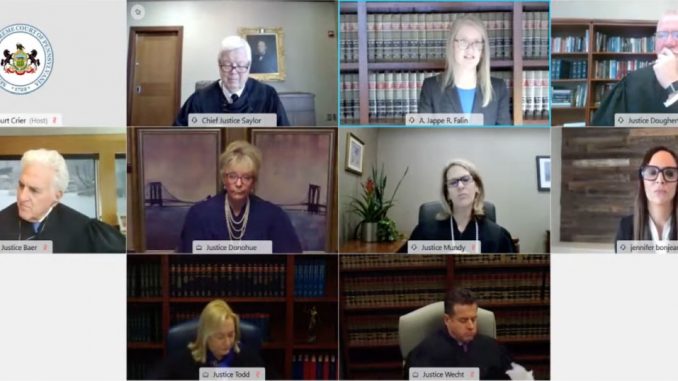
Content warning: This story mentions sexual assault.
The Pennsylvania Supreme Court began hearing arguments from lawyers representing Bill Cosby and the Commonwealth of Pennsylvania today for the appeal of Cosby’s 2018 conviction of sexually assaulting Temple University employee Andrea Constand.
The Pennsylvania Supreme Court agreed to hear arguments for the appeal in June, The Temple News reported.
Cosby, a former Temple trustee, was found guilty of three counts of aggravated indecent assault in April 2018, The Temple News reported. Cosby was sentenced to three to 10 years and ordered to pay a $25,000 fine in September 2018, The Temple News reported.
The justices will first decide if it was fair for the trial judge to consider testimonies from five women who said they were also abused by Cosby during encounters dating as far back as the 1980s. The testimonies were necessary because they demonstrated a pattern of behavior from Cosby, said Adrienne Jappe, a lawyer representing the Commonwealth.
“The defendant engaged in a years-long signature predatory pattern of seeking out and intentionally isolating young women so he could intoxicate them for the ultimate purpose of sexually assaulting them,” Jappe said.
However, Cosby’s attorneys argued the inclusion of the testimonies exaggerated the magnitude of his actions and unfairly villainized him to the jury.
“This court should rule to protect the time cherished rule, not just because it’s Bill Cosby or to right a wrong in this case, but because the constitutional guarantees of presumption of innocence, the burden of proof and even due process that frame our criminal justice system are at stake,” said Jennifer Bonjean, Cosby’s defense attorney.
The justices will also decide whether Cosby made a binding agreement with the former Montgomery County District Attorney Bruce Castor for immunity from criminal prosecution in 2005, said Chief Justice Thomas Saylor.
In a 2005 press release, Castor, the former district attorney, said he would not file criminal charges against Cosby because there was not sufficient evidence to prove he had committed a criminal offense during his encounter with Constand. Cosby’s attorneys argued today this proved he made a deal with Castor, meaning Cosby should not have been tried in 2018.
“The promise not to prosecute would be honored so long as Mr. Cosby agreed to sit for this deposition and give testimony and not invoke his fifth amendment right, which he did again to his detriment,” Bonjean said.
Robert Falin, another lawyer representing the Commonwealth, argued Castor’s press release only clarified Castor’s stance on the case, and did not grant Cosby immunity.
“That same press release leaves open the possibility that that case will be reconsidered,” Falin said. “In the press release, the District Attorney Castor says, [he] ‘cautions all parties to this matter that he will reconsider this decision should the need arise.’”
Cosby is serving his sentence at State Correctional Institution Phoenix in Collegeville, Pennsylvania, The Temple News reported.



Be the first to comment